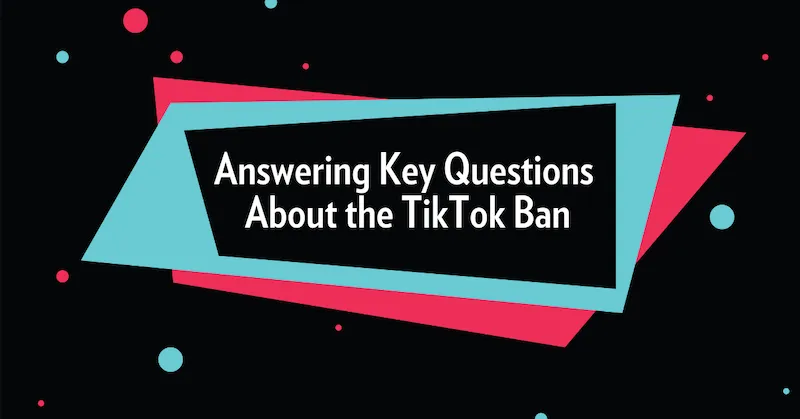
Answering Key Questions About The TikTok Ban
This week, it seems that the name on everyone’s lips has been TikTok. While the looming ban by the United States government doesn’t mean the app will go dark on January 19, it will face a slower disintegration as it can no longer be updated and eventually rendered useless. In the last five years, TikTok has boosted the careers of creators and the success of businesses in a way we haven’t seen since other social media giants stepped onto the scene years prior. The app’s impact cannot be understated, which means the aftershock will without a doubt be felt throughout the world of marketing. How can you prepare for the incoming TikTok ban?
What Makes TikTok Unique?
TikTok has stood out from other social media platforms due to several key factors–perhaps most notably, its powerful algorithm. Unlike traditional social media apps whose feeds prioritize content from friends and followed accounts, TikTok’s “For You” page delivers a hyper-personalized stream of videos based on how each individual user interacts with the app. It does this by analyzing thousands of signals, including watch time, likes, comments, and user interactions to cater to this user. Additionally, every new video is automatically served to 300-500 users and analyzed based on how it performs. This means that every video has the potential to take off, even without a paid promotion.
For small businesses, TikTok offers a relatively low barrier to entry. Other platforms where can take years to build a large following, whereas TikTok allows businesses to quickly reach a wide audience due to this specialized algorithm. While organic reach on other platforms is increasingly challenging, TikTok still offers significant opportunities for businesses to gain organic visibility. By creating engaging content that resonates with users, many small businesses have found success in reaching a large audience more quickly without significant paid advertising.
Will Marketers Lose Access to Important Data?
While a TikTok ban would undoubtedly impact marketers by restricting access to a significant audience, the data collected by TikTok itself is not entirely unique. Many other social media platforms, such as Facebook and Instagram, collect comparable data points, including user demographics, viewing habits, and in-app behavior. In fact, research suggests that TikTok may even collect less data in some instances compared to platforms like Facebook.
However, the value of TikTok’s data lies not just in the specific data points collected, but in the unique way TikTok utilizes this data to power its sophisticated algorithm. This algorithm, which personalizes the “For You” feed with remarkable accuracy, has proven invaluable for marketers in reaching their target audiences and driving engagement. Losing access to this powerful algorithm and the valuable insights it provides would undoubtedly be a significant setback for many marketers.
What Will Take TikTok’s Place?
While platforms like Instagram Reels and YouTube Shorts offer similar short-form video features, it’s crucial to remember that these platforms may not replicate TikTok’s unique strengths. Some users, particularly those opposed to the ban, may even gravitate towards alternative platforms like RedNote, another Chinese-owned app. In other cases, some users plan to use a VPN in order to access the content as if they were outside of the United States.
Marketers should avoid simply shifting advertising budgets formerly allocated to TikTok directly to these platforms. Because other apps still lack the special sauce that made TikTok so successful for businesses, we shouldn’t assume those dollars will be best spent on advertising elsewhere. Moreover, if your marketing plan includes creator sponsorships, do not expect those creators to perform as successfully on other apps. Rethink how influencers fit into your marketing plan.
This ban underscores the importance of a diversified marketing strategy. Relying solely on one platform for marketing success can be risky. Marketers should always be exploring and experimenting with various platforms to identify the most effective channels for reaching their target audience. Proactive planning and adaptability will be key to navigating this potential shift in the social media landscape.
Need some direction for your social media marketing? Get in touch with Vibrant today!